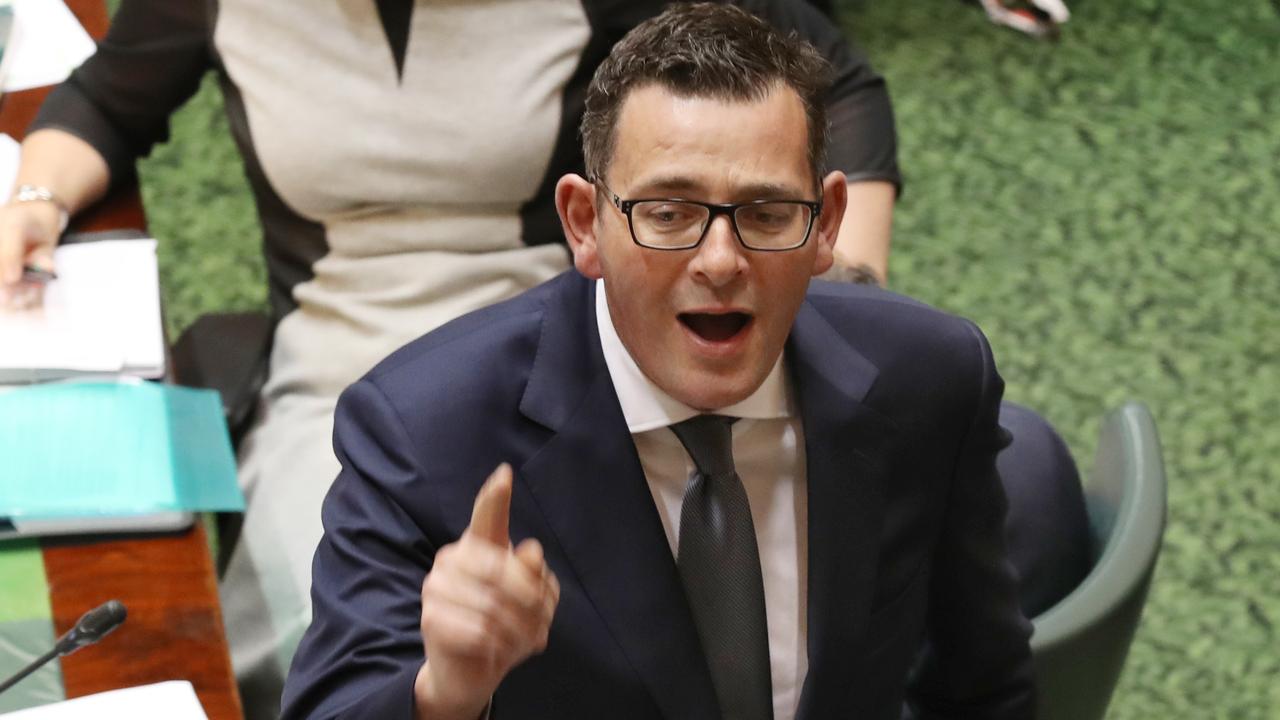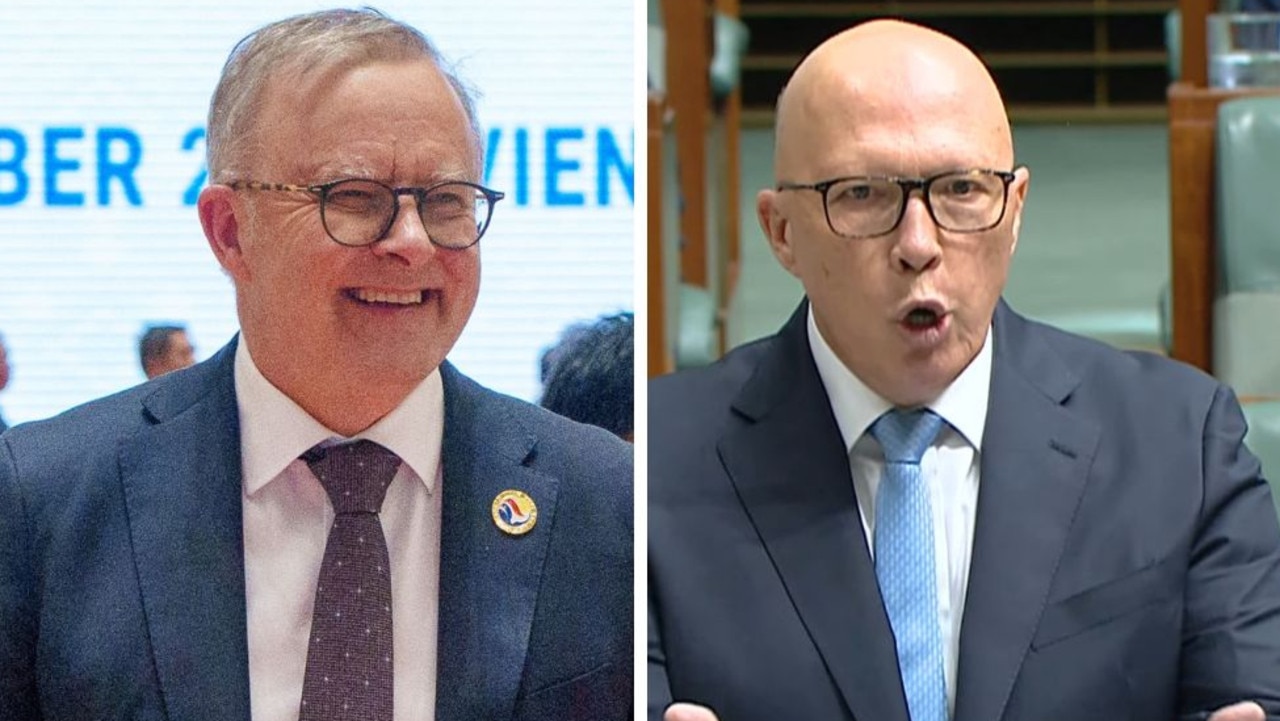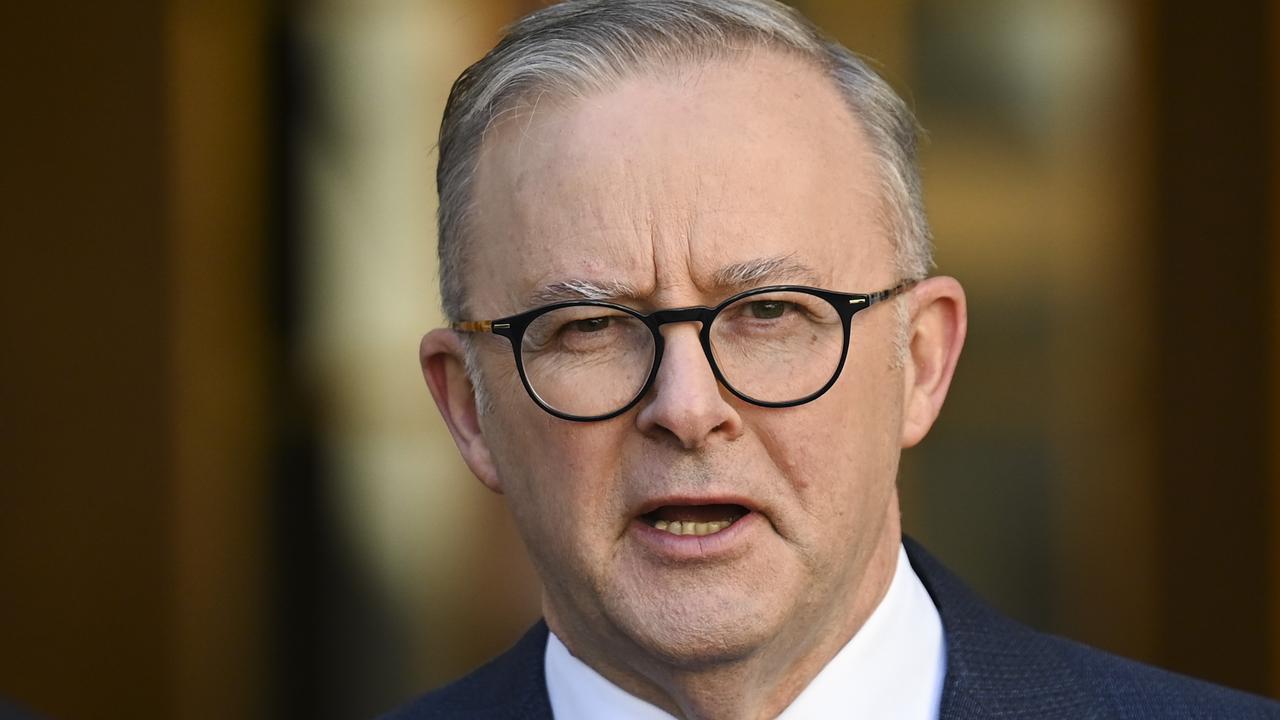Patrick Carlyon: History happened on his watch but how will Dan Andrews be remembered?
After nine years in power, Dan Andrews still feels largely unknowable. How will Victorians remember him?
The cheer squad is perched on top of Victoria’s parliament, where native plants sweep on to views of the city skyline, and state politicians sometimes duck out for sneaky ciggies.
Treasurer Tim Pallas wears sunglasses. Newly minted minister Stephen Dimopoulos is the appointed cheerleader.
Cue big applause, ready for vigorous nodding, as Premier Dan Andrews arrives, with wife Cath, arm-in-arm with their two sons, for his last press conference as premier.
Andrews knows what he wants to say (and what he does not). He always does.
“Ok, you guys right to go?” he asks, as if launching into another policy announcement.
If his voice starts to catch, perhaps once or twice, he channels that bullet-pointed determination reserved for high crisis.
There will be no tears – that’s for other retiring premiers. Instead, the exit of Andrews, the long anticipated moment, will be stripped of undue emotion. He could be on the hustings, revealing a new strategy of which no one has the slightest inkling:
“It. Is. The. Right. Thing. To. Do.”

Yet Andrews does flick the switch. His forbidding discipline is for hardship, along with hints of disdain or impatience with silly questions. Today, gratitude is bulletpoints one and two, followed by pride at three and four.
His time has been a “gift”. But “the blessing” has been all encompassing. He is “worse than a workaholic”. Being leader is every minute of every day. “There’s an old saying in politics: go when they’re asking you to stay,” he says.
So he’s heading off to read a pile of books, play some golf. No regrets and, if you take him at his word, few reflections.
Andrews will leave the legacy questions to others, apparently comfortable in his belief that he hasn’t pandered to the loudest voices.
His abiding obligation, in polite language, has been to get “things done”.
“Leadership is about subjecting yourself to judgement, the almost continuous judgement of others,” he says. “And you know that going in, that that’s what it is about, and it’ll be for others to judge my time.”

Andrews will be remembered as a long-serving Labor premier. But his style was not particularly Labor.
Of ideology, he differed from other political autocrats, such as Henry Bolte and Jeff Kennett.
But like them, he thrived in the face of weak Oppositions. Like them, he evoked visceral responses. And like them, he commanded an electoral mandate, even though his detractors hated him.
He has changed a city and a state more profoundly than any other modern leader.
The Big Build has and will mean Big Change for a state lacking in infrastructure investment before his terms in office.
He can boast social reforms which hark back to his origins in the Socialist Left.
Andrews pushed for voluntary assisted-dying reform. He made roads better by his 2014 election-winning promise of eliminating dozens of rail crossings.
The massive infrastructure makeovers will be completed, albeit with budget blowouts and delays.
And there is debt, hundreds of billions of dollars of it. And there is Andrews’ singular style that even his admirers might hope will never be faithfully replicated.
Andrews didn’t always ooze game-changing bigness.
He was a country kid, the son of a small-business owner who voted National. He embraced the ALP movement after an arts degree at Monash University. Besides selling hot dogs, and driving trucks, his entire career has been ensconced in the Labor cocoon – from party hack to factional brawler to premier.
It says something of the trajectory ahead that Andrews spent zero days in parliament as a backbencher.

As a Catholic who became Health Minister, he decriminalised abortion in 2008 because he was not a “Catholic Health Minister” but “Victoria’s Health Minister”.
In 2014, when the hot ticket item was an iPhone 6, many voters barely knew of Andrews; the supposedly quiet nerd with the wardrobe makeover. He started calling himself Dan before this winning election, a turnaround from the serious young man who had corrected people when they tried to shorten “Daniel”.
By 2018, Andrews had shown he did get things done, notwithstanding the odd scandal or three, and hints of a centralised power structure which later provoked cult of personality comparisons with less democratic realms.

For the 2022 election, Andrews was vocally loathed, in a hateful rhetoric which descended into personal threats. Yet in victory, the knockers hardly mattered; nor did the stats showing that most Victorians voted for parties which were not Labor.
Andrews was more in control than ever before. His electoral night party, in Mulgrave, was more about satisfaction than jubilation, like a Hawthorn premiership team after its third win in a row.
As Andrews told the crowd: “Paul Keating said to me, ‘Son, leadership isn’t about doing what’s popular, leadership is about doing what’s right … hope always defeats hate.”
Andrews was a fixture to be accepted, if not universally adored. He could stay as long as he liked, it seemed.
He had done so by changing the game of politics. He ignored stalwarts of power, mainstream media such 3AW’s Neil Mitchell and the Herald Sun, by pioneering a direct approach via social media. He, or his team, distilled complex economics to one or two feel good slogans.

It obviously resonated for many younger people, in what Mitchell calls a “Twitter-driven grasp on power”.
“He has set a model for other states and federally, that model being a total lack of accountability, with a brutal form of vindictiveness,” Mitchell says.
“I do worry that he has set up a template for a very anti-democratic form of government.”
One-on-one, in interview, Andrews projected no hostility, but little warmth, either. He was all business, although not above a joke, perhaps hinting of the razor wit we heard about but never saw.
He liked a red wine, and a fag, but that was strictly off-screen. The fun bits were rumours rather than displays. He would share what the moment demanded. Nothing more.
It led to cynical takes on his 2014 campaign visit to his dying father, say, or the occasional lovey-dovey social media posts with wife Catherine. Were these sincere intimacies to be shared, or were they projected with political advantage in mind?
That’s the thing. After nine years in power, of decisions which affected freedoms and livelihoods like no other modern democratic leader, Andrews still feels largely unknowable.

The adjectives have consistently flowed over the years. Determined. Ruthless. Quick to decision and intolerant of criticism. He was the Daggy Dad who was also the control freak workaholic.
In a recent biography, Andrews was characterised as a socially progressive despot who did not respect the people in his path or the democratic institutions enshrined to ensure a collegiate consensus approach to government.
You stood with Dan. Or you were toppled by Dan. As someone said, Andrews treated his enemies better than his friends.
His rejection of some colleagues to the so-called Freezer lent from Tom Gleeson’s Hard Quiz catchphrase – “You’re dead to me.” On being blamed for Covid deaths, Health Minister Jenny Mikakos spoke of “another masterclass of political deflection”.
In assessing the book, Daniel Andrews: the Revealing Biography of Australia’s Most Powerful Premier, by Sumeyya Ilanbey, a reviewer said the author showed us “a leader whose decision-making has become warped by a self-indulgent culture of cronyism, surrounding himself with yes-men and yes-women, making snap decisions and ignoring warnings about their consequences”.
Ilanbey depicted Andrews as a narcissist who thought he was the smartest person in the room and ignored any questioning of his decisions.
Andrews could publicly apologise for mistakes, not that they ever seemed to be of his doing. If there was a scandal, Andrews would act as though there was not.

Any one of them, from Red Shirts to pandemic hotel quarantine, to the tawdry politicking of the United Firefighters Union (which flared afresh this week) might have derailed an ordinary leader in conventional times.
When Andrews canned the Commonwealth Games this year, he tried his long applied “what’s bad is good” sell for what appeared to be a case study in political ineptness. Had his PR spell started to wane, given the decision and its handling seemed to evoke a statewide sense of embarrassment?
Andrews, like all most memorable leaders, thrived in crisis. History happened on his watch.
He reshaped politics. There was no error of judgement, or question of impropriety, that he could not seek to sideline.
He was the premier who fronted every day during the pandemic. Answered every question. And told you nothing besides what he wanted you to hear.
He also, at times, found the words which stuck, a knack that has so far eluded his “dear friend” Anthony Albanese as prime minister. When Cardinal George Pell was acquitted, Andrews response to sex abuse victims was the only one you remember: “I see you. I hear you. I believe you.”
History will tend to underline his rigid handling of the pandemic. Through force of conviction (or grim omnipotence), he commanded a pandemic perch that towered over then prime minister Scott Morrison. He did while others dithered, in making choices that no other leader felt compelled to make.

When he locked public housing tenants in their homes, with no notice, Andrews didn’t bother with shows of regret. You doubt that he later agonised over such decisions, as did some of his colleagues, who privately wrestled with cost of life versus loss of liberty equations throughout the worst of the lockdowns.
He coined his own lingo for lockdowns, in policies that triggered a Stockholm syndrome-like reliance in some fearful Victorians. He was keeping us safe, he explained, even when it felt like he was keeping us trapped.

“An abundance of caution is never a bad thing,” he would say, though it plainly did not apply to probes and inquiries which aimed to preserve at least the perception of integrity.
There were so many scandals, and ministerial resignations, in runs which might be expected over such a long term in office. There was also that stridency of the pandemic response, which many Melburnians still flinch from a couple of years later.
In this there was a hardness that defied science, or indeed warmth, in the closure of playgrounds, say, or the cancelling of funerals, or the locking down of towns because of a handful of Covid cases hundreds of kilometres away.
If history is unkind to a misplaced harshness in such measures, so, too are statistics that placed Victoria’s death rates as higher than any other Australian state.

Some people never got over Jeff Kennett. Say his name now, a generation since he lost power, and they reel off the perceived injustices he committed as if Kennett was in office until last week.
What will be Andrews’s legacy besides the “big builds” and the even bigger debt?
He certainly changed the rules of the game. Even Kennett, who like Andrews seemed to inflate in the face of criticism, bowed to Cabinet consensus.
After the Commonwealth Games were cancelled, The Australian journalist Greg Sheridan summed up the Andrews approach: “Victoria’s is a pretty weird Australian state of government. It combines the ideology of Bernie Sanders and the social policies of San Francisco with the fiscal prudence of Puerto Rico.”
Will the Dan believers still be believing in a generation from now, as they did with Bolte?
And will the haters still hate?



